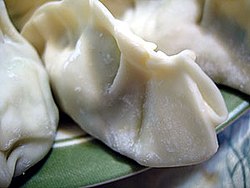餃子
Hello, you have come here looking for the meaning of the word 餃子. In DICTIOUS you will not only get to know all the dictionary meanings for the word 餃子, but we will also tell you about its etymology, its characteristics and you will know how to say 餃子 in singular and plural. Everything you need to know about the word 餃子 you have here. The definition of the word 餃子 will help you to be more precise and correct when speaking or writing your texts. Knowing the definition of餃子, as well as those of other words, enriches your vocabulary and provides you with more and better linguistic resources.

餃子 (gyōza): a plate of raw dumplings or potstickers, ready to be fried, boiled, or steamed.
See also: 饺子
Chinese
| dumplings with meat filling | child; son; (noun suffix) child; son; (noun suffix); small thing; seed; egg; 1st earthly branch; 11 p.m.–1 a.m., midnight | ||
|---|---|---|---|
| trad. (餃子) | 餃 | 子 | |
| simp. (饺子) | 饺 | 子 | |
Etymology
Pronunciation
- Mandarin
- (Standard)
- (Chengdu, Sichuanese Pinyin): jiao3 zi3-2
- (Dungan, Cyrillic and Wiktionary): җёзы (ži͡ozɨ, II-I)
- Cantonese
- (Guangzhou–Hong Kong, Jyutping): gaau2 zi2
- (Taishan, Wiktionary): gau2 du2
- Gan (Wiktionary): jieu3 zi
- Jin (Wiktionary): jiau3 zeh
- Wu (Shanghai, Wugniu): 5ciau-tsy5; 1ciau-tsy5
- Xiang
- (Changsha, Wiktionary): jiau3 zr
- (Hengyang, Wiktionary): jiau3 zr
- Mandarin
- (Standard Chinese)
- Hanyu Pinyin:
- Zhuyin: ㄐㄧㄠˇ ˙ㄗ
- Tongyong Pinyin: jiǎozi̊h
- Wade–Giles: chiao3-tzŭ5
- Yale: jyǎu-dz
- Gwoyeu Romatzyh: jeau.tzy
- Palladius: цзяоцзы (czjaoczy)
- Sinological IPA (key): /t͡ɕi̯ɑʊ̯²¹⁴ d͡z̥z̩⁴/
- Homophones:
角子
餃子 / 饺子
- (Chengdu)
- Sichuanese Pinyin: jiao3 zi3-2
- Scuanxua Ladinxua Xin Wenz: giaoz
- Sinological IPA (key): /t͡ɕiau⁵³ t͡sz̩⁵³⁻²¹/
- (Dungan)
- Cyrillic and Wiktionary: җёзы (ži͡ozɨ, II-I)
- Sinological IPA (key): /t͡ɕiɔː⁵¹ t͡sz̩²⁴/
- (Note: Dungan pronunciation is currently experimental and may be inaccurate.)
- (Standard Chinese)
- Cantonese
- (Standard Cantonese, Guangzhou–Hong Kong)+
- Jyutping: gaau2 zi2
- Yale: gáau jí
- Cantonese Pinyin: gaau2 dzi2
- Guangdong Romanization: gao2 ji2
- Sinological IPA (key): /kaːu̯³⁵ t͡siː³⁵/
- (Taishanese, Taicheng)
- Wiktionary: gau2 du2
- Sinological IPA (key): /kau⁵⁵ tu⁵⁵/
- (Standard Cantonese, Guangzhou–Hong Kong)+
- Gan
- (Nanchang)
- Wiktionary: jieu3 zi
- Sinological IPA (key): /t͡ɕiɛu²¹³⁻²¹ t͡sz̩¹/
- (Nanchang)
- Jin
- (Taiyuan)+
- Wiktionary: jiau3 zeh
- Sinological IPA (old-style): /t͡ɕiau⁴⁵ t͡səʔ⁴/
- (Taiyuan)+
- Wu
- Xiang
- (Changsha)
- Wiktionary: jiau3 zr
- Sinological IPA (key): /t͡ɕi̯ɒu̯⁴¹ t͡sz̩³/
- (Hengyang)
- Wiktionary: jiau3 zr
- Sinological IPA (key): /t͡ɕi̯ɑʊ̯³³ t͡sz̩³/
- (Changsha)
Noun
餃子
- crescent-shaped dumpling; jiaozi; gyoza
- (dialectal) wonton (Chinese dumpling stuffed with meat or seafood and vegetables)
Synonyms
- (jiaozi):
- (wonton):
Dialectal synonyms of 餛飩 (“wonton”)
Hyponyms
Derived terms
Descendants
- → English: jiaozi
- → French: jiaozi
- → Japanese: 餃子 (gyōza)
- → English: gyoza
- → Russian: цзя́оцзы (czjáoczy)
Japanese

| Kanji in this term | |
|---|---|
| 餃 | 子 |
| ぎょう Hyōgai |
ざ Grade: 1 |
| kan'yōon | irregular |
Etymology
Borrowed from Mandarin 餃子/饺子,[1][2][3] possibly from a Mandarin variety without significant palatalization (i.e. *giaozi), or from a non-Mandarin variety of Chinese. Compare also Korean 교자(餃子) (gyoja).
Pronunciation
Noun
- gyoza: a kind of dumpling or potsticker with a thin skin, traditionally made with minced pork and then fried, boiled, or steamed
Derived terms
Derived terms
References
- ↑ 1.0 1.1 Matsumura, Akira, editor (2006), 大辞林 [Daijirin] (in Japanese), Third edition, Tokyo: Sanseidō, →ISBN
- ^ Matsumura, Akira (1995) 大辞泉 [Daijisen] (in Japanese), First edition, Tokyo: Shogakukan, →ISBN
- ↑ 3.0 3.1 NHK Broadcasting Culture Research Institute, editor (1998), NHK日本語発音アクセント辞典 [NHK Japanese Pronunciation Accent Dictionary] (in Japanese), Tokyo: NHK Publishing, Inc., →ISBN

